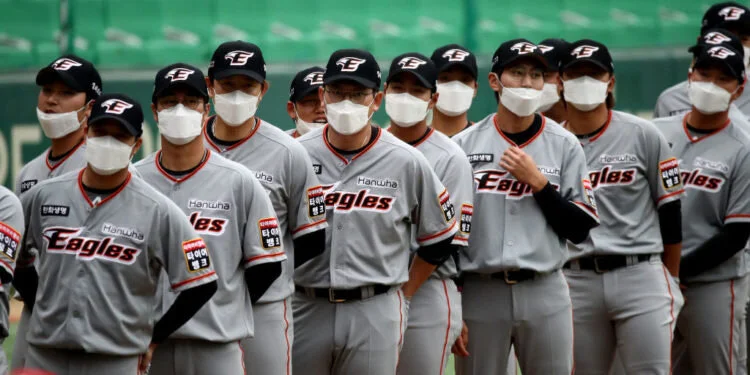Baseball is Back. . . Pandemic Style
AP
The Korean Baseball Organization provides desperate fans a glimpse of live sports
Many of us North American fans honestly don’t know what to do with the absence of professional sports. Our sports-hungry minds are somewhat satisfied with ESPN’s captivating TV series The Last Dance that airs every Sunday, but without live games to fill us with joy every day, some of us are lost.
Fortunately, ESPN acquired the rights for the Korean Baseball Organization (KBO), one of the first leagues across the globe to return to live play post-coronavirus. Fake fans, masked mascots and dancing cheerleaders mark just a few of the differences seen in the KBO League. But hey, it’s still baseball.
The KBO League was founded in 1982 and currently consists of 10 teams. The regular season is 144 games, with each team playing the others 16 times. The Kia Tigers have historically been the most dominant, with 11 Korean Series titles, but the defending champions are the Doosan Bears who are looking to claim their 7th championship during the 2020 campaign.
In the wee morning hours on the east coast on Tuesday, May 5, the first pitch for the KBO… happened. Notice how I did not say “was thrown” here, because this first pitch was unlike any other—it followed social distance protocol. It consisted of a kid walking from the mound to home plate in a large inflated bubble that resembled a baseball.
In the stands, cheerleaders and drummers danced six feet apart and led cheers for non-existent fans. Instead, there were fake people in the audience–mannequin-looking fans dressed in team gear with their arms raised and soulless eyes staring at the field. Welcome to baseball in the coronavirus era.
There is another aspect of the KBO that shocked American viewers during Opening Day: bat throws. Notice how I did not say “flip” here because to do so would be unjust to this artistic celebration. The bat is basically chucked into the air after a home run is rocked out of the stadium. Some bats are spiked, others are flung, and not only is it allowed, but it is highly encouraged. The higher and saucier the better.
In this agreement with South Korea, ESPN also provides full English commentary led by top broadcasters Karl Ravech and Jessica Mendoza. Some of these games air in the middle of the night and lineups are filled with unknown players, but Ravech is up for the unique challenge.
“This is the season for baseball, so I think it’s a really neat opportunity,” Ravech said. “I’ve certainly gone out of my way to learn [name pronunciations] as much as I can, and we’re going to learn along with the audience.”
The level of play in this league seems to be in between the Double-A and Triple-A styles of baseball, a couple tiers below Major League Baseball (MLB). This is largely due to the fact that a lot of these players are trying to get to the Big Leagues themselves, or even resurrect their careers from MLB. There are actually 11 former major-leaguers who had KBO season debuts on Tuesday.
So if you are in need of a sports fix, you can watch six live games per week airing primarily on ESPN2 at 5:30 am EST on weekdays and 1 am EST on weekends. Or you can go above and beyond like my family and create your own Fantasy KBO League, with a draft, back and forth banter and a buy-in. You can even practice some bat flips of your own, though be careful not to take out a window while you’re at it.
Whatever needs to happen to sustain your sports needs during this unprecedented time, play ball.
